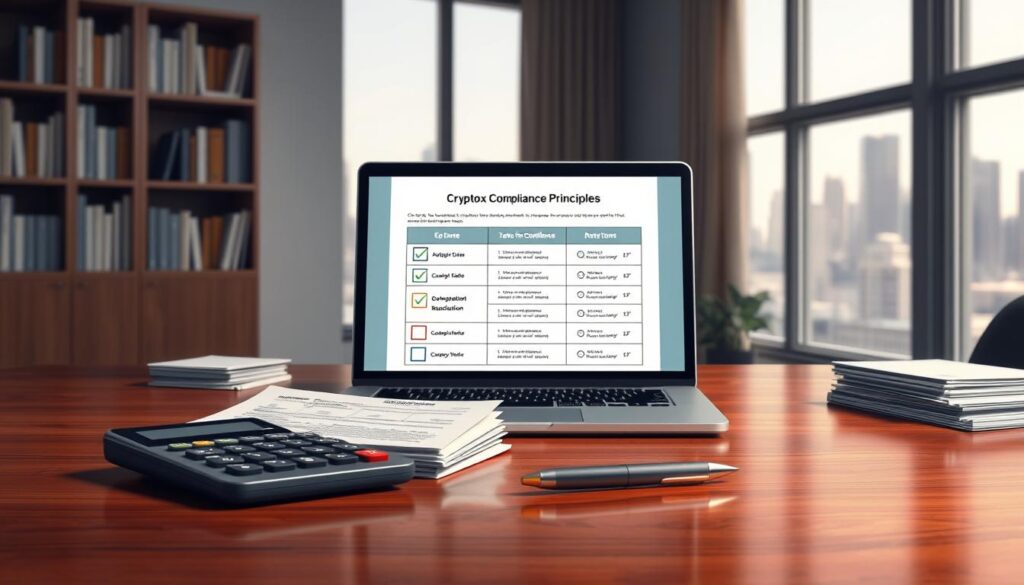Crypto tax reporting for ICO investments needs to be precise. The IRS closely watches digital asset deals. This guide helps you understand how to follow cryptocurrency tax rules for Initial Coin Offerings.
It covers how to value, track, and keep up with changing rules. Reporting correctly helps avoid penalties and meets legal standards.
Investors deal with changing token values and complex IRS rules. This guide explains what you need to do. It covers everything from filing forms to avoiding mistakes.
Each part offers steps to report accurately and stay compliant in the long run.
Key Takeaways
- Learn IRS guidelines for classifying ICO tokens as property or income.
- Discover how to track cost basis and calculate capital gains on ICO transactions.
- Understand mandatory forms like Form 8949 and Schedule D for crypto tax compliance.
- Avoid penalties by addressing airdrops, forks, and exchange fees in reporting.
- Explore tools and professionals to simplify crypto tax reporting for ICOs.
Understanding ICO Investments from a Tax Perspective
Crypto fans and investors need to know about ICO tax obligations when buying tokens. An initial coin offering (ICO) raises funds by issuing digital tokens. This means you have tax duties when you join these events. The IRS sees virtual currencies as property, so every transaction can lead to taxes.
What Qualifies as an ICO Investment
Spending fiat or crypto in a token sale tax requirements is an investment. The IRS sees it as trading value for future rights. Even if you don’t sell tokens right away, their purchase sets a tax base for later.
Keeping tokens long-term or trading them affects how you report gains.
How the IRS Classifies Cryptocurrency and Tokens
IRS Notice 2014-21 calls cryptocurrency property, not money. So, buying tokens in an ICO is like buying stocks or real estate. Initial coin offering tax liabilities come up when tokens are sold, traded, or used for goods/services. You must track each transaction’s value to figure out gains or losses.
The Difference Between Security Tokens and Utility Tokens
- Security tokens: Treated like stocks. Dividends or price increases may lead to capital gains taxes.
- Utility tokens: Used for accessing platforms (e.g., decentralized apps). Their use or sale still requires tracking cost basis.
Misclassifying tokens can lead to penalties. The Howey Test helps figure out if a token is a security. It looks at investment intent and reliance on a third party’s efforts.
The Current Regulatory Landscape for Cryptocurrency Taxation
In the U.S., rules for taxing digital assets are changing. The IRS sees virtual currencies as property for tax purposes. This view is backed by the Infrastructure Investment and Jobs Act of 2021. This law made brokers report crypto deals over $10,000.
This change brings new challenges for those involved in ICOs. It’s important to follow these rules to avoid trouble.
Agencies like the SEC and FinCEN are key players. The SEC checks if tokens are securities, which affects taxes. FinCEN watches transactions over $10,000 with virtual currencies. But, there are still unclear areas in ICO rules.
- IRS guidance from 2014 is the main rule, but it’s not clear for new crypto.
- SEC works to stop scams, saying many ICOs are securities.
- FinCEN fights money laundering in crypto exchanges and brokers.
There’s still confusion in DeFi and NFTs. People need to keep up with tax rules to avoid fines. Knowing the latest from the IRS and SEC helps stay legal in a fast-changing world.
Crypto Tax Reporting for ICO Investments: Basic Principles
Understanding cryptocurrency tax compliance begins with the basics. This part explains the key rules for Crypto tax reporting for ICO investments. It makes it clear how to handle gains and losses according to IRS rules.

Capital Gains vs. Ordinary Income Treatment
When you sell ICO tokens, you usually pay capital gains tax. But, tokens earned as payment or airdrops might be seen as regular income. The IRS looks at these cases differently, so knowing where your tokens come from is key.
Holding Periods and Tax Rate Implications
- Short-term: Tokens held
- Long-term: Tokens held ≥ 1 year qualify for preferential capital gains rates (0%, 15%, or 20%).
Cost Basis Determination for ICO Tokens
To figure out cost basis, find the fair market value at purchase. For example, buying $500 worth of XYZ tokens with Bitcoin means your basis is the crypto’s USD value at that time. If you got discounts or bonus tokens, you must track each token’s initial cost separately.
Keeping accurate records is crucial for cryptocurrency tax compliance. Without the right info, you could face penalties. Use your transaction logs to meet IRS Form 8949 needs.
Documentation Requirements for ICO Investments
Keeping accurate records is key for meeting ICO tax obligations and following blockchain tax reporting rules. Investors need to track all transactions carefully. This helps avoid audits and ensures they meet IRS standards.
- Save all transaction confirmations with unique hashes, dates, and amounts.
- Log wallet addresses, exchange accounts, and private keys securely.
- Archive emails, whitepapers, and contracts from ICO issuers.
- Document pre-sale agreements and vesting schedules.
Use platforms like CoinMarketCap or CoinGecko to track token values at purchase. For tokens not listed, keep records of development steps and market comparisons. Blockchain explorers like Etherscan help verify transfers.
- Document all token transfers between wallets with timestamps.
- Note exchanges between tokens or fiat conversions.
- Record airdrops and migrations in spreadsheets or software tools like Koinly or CoinTracker.
Keep all records in one place, both digital and physical. Regularly check your records to stay up-to-date with blockchain tax reporting changes. Good documentation helps avoid penalties related to ICO tax obligations.
Calculating Taxable Events in Your ICO Journey
Every step in your ICO journey can lead to taxable events. The IRS sees token purchases, sales, and uses as taxable. Start by tracking your purchases: buying tokens with fiat or crypto sets a cost basis for future taxes. When you swap tokens for goods, services, or other cryptocurrencies, this is a taxable event that needs capital gains reporting.
- Token swaps: Forks or protocol upgrades may generate new assets, each taxable under IRS guidelines.
- Airdrops: Free token distributions still count as income subject to initial coin offering tax liabilities.
- Losses matter too: If tokens are lost or stolen, document the event to claim deductible losses.
Donations and staking rewards also create tax obligations. For example, donating tokens turns them into taxable gains based on their current value. Check country-specific rules to follow local token sale tax requirements. Ignoring airdrops or undervaluing swaps can lead to penalties. Use tracking tools for every transaction, from purchase dates to exchange rates. Remember, even failed ICOs may need reporting under IRS loss rules. Treat every token movement as a potential taxable trigger to stay compliant.
Step-by-Step Process for Reporting ICO Investments on Your Tax Return
When it comes to crypto tax reporting for ICO investments, following IRS guidelines is key. First, collect all your transaction records. This includes the dates you bought or sold, the prices, and where you made the exchange. Use tools for cryptocurrency tax compliance to keep your data organized before you start filling out forms.
Important IRS forms you’ll need are Form 8949 for each crypto transaction and Schedule D to sum up your gains or losses. If you have foreign assets, you might need to file FBAR or Form 8938 if the value is over certain thresholds. Here’s what to do:
- Form 8949 Completion: List each ICO token sale, noting buy/sell dates, proceeds, and cost basis. Separate short-term (
- Schedule D Reporting: Transfer totals from Form 8949 to Schedule D. Include gains/losses from ICO tokens alongside traditional investments.
- Foreign Accounts: Report crypto held in offshore exchanges on FBAR if balances exceeded $10,000 at any point. Form 8938 applies to larger portfolios.
Airdrops or forked tokens must be reported at fair market value on the day received. Losses from failed ICOs qualify as capital losses but require proof of token disposal.
Use screenshots of IRS forms to visualize entry points. Double-check your calculations to avoid penalties. Cryptocurrency tax compliance ensures accuracy amid evolving regulations.
Common Mistakes to Avoid When Reporting ICO Investments
Getting cryptocurrency tax compliance right for ICOs is crucial. Many investors make mistakes that cost them a lot. Here’s how to dodge common errors and follow virtual currency tax laws.
Misclassification of Token Types
Calling security tokens utility tokens can lead to wrong tax treatment. The IRS sees security tokens as stocks, needing capital gains reports. Utility tokens might have different rules. Use IRS guidelines to check if your tokens fit the right category.
Failure to Report Airdrops and Forks
Airdrops and hard forks are taxable under virtual currency tax laws. Even getting tokens for free needs to be reported. Skipping these can lead to IRS audits.
Overlooking Exchange Fees in Cost Basis Calculations
Exchange fees cut down your net gains, lowering what you owe in taxes. Forgetting these costs can make your taxable income too high. Make sure to include all fees in your cost basis calculations.
Other mistakes include thinking like-kind exchanges still work (they don’t since 2018), ignoring wash sale rules for losses, and ignoring small transactions under $600. Even small mistakes can lead to penalties. Keeping accurate records is key to avoiding trouble.
Intentionally not reporting can lead to IRS penalties, audits, and back taxes. Stay on top of cryptocurrency tax compliance rules and keep detailed records. Being proactive helps avoid disputes and ensures your reports are accurate.
Special Tax Considerations for Failed ICOs and Rug Pulls
Failed ICOs or rug pull scams can leave investors with big financial and tax problems. The IRS lets you claim losses to lower initial coin offering tax liabilities. But, you need solid proof.
To qualify, tokens must be seen as worthless, with no chance of getting your money back. You must show the ICO failed through official statements or clear signs of abandonment.
- Track the date the project ceased operations or declared bankruptcy.
- Save communications showing the team’s disappearance or project termination.
- Document market value drops to zero using price charts or exchange data.
Rug pulls, where developers take the money and run, might be seen as theft losses. You can deduct these under IRS rules if you report the loss on Form 8949. To claim theft losses, file with Form 8949 and attach explanations of the fraud.
When to claim losses is important. You must report them in the year you knew the project failed, not when you invested.
Getting some of your money back can make things more complicated. If you recover funds through lawsuits or settlements, you might have to pay taxes on it. Always talk to a tax expert to make sure you follow ICO tax obligations and avoid audits. Proper reporting can help offset losses and follow IRS rules.
Tax Implications of Staking and Earning Returns on ICO Tokens
Staking rewards and yield-generating activities make digital asset tax regulations more complex. Investors must track all income from ICO tokens, including staking returns and DeFi platforms. The IRS sees staking rewards as taxable when they are received, so it’s important to report them correctly to avoid penalties.

Staking rewards are taxed as regular income under current IRS rules. Legal cases like Jarrett v. United States might change this, but for now, you must report all rewards at their fair market value. Mining and staking have different tax treatments:
- Mining: Seen as self-employment income with deductible business expenses
- Staking: Viewed as investment income without business expense deductions
DeFi activities add more complexity. Things like liquidity provision or yield farming create taxable events when tokens are received. Even if you lose money, you still have to report any gains from these activities.
Accurate blockchain tax reporting means tracking every transaction with staked tokens. Use tools to keep track of forked tokens, airdrops, and token swaps specific to protocols. Not doing this could lead to misreporting under changing digital asset tax regulations.
Working with Crypto Tax Software for ICO Reporting
Crypto tax reporting for ICO investments can be made easier with special software. Tools like CoinTracker, TokenTax, and Koinly help track presales, vesting schedules, and token swaps. They connect with exchanges, wallets, and blockchain explorers to make record-keeping simpler.
These solutions have features like cost basis calculations and Form 8949 generation. Users can import their transaction history to find gains or losses automatically. For instance, vesting periods for ICO investments are tracked to figure out capital gains rates.
Setting up the software takes three steps: connecting exchange APIs, importing CSV files, or manually entering data. The software checks transactions against market data to find taxable events. Before exporting tax forms, review the calculated results. You might need to make manual changes, like fixing token swap dates.
However, these tools have limits, especially for complex cases like rug pulls or defunct tokens. Users might need to use spreadsheets for these cases. Always check the software’s outputs against your original records to follow IRS rules. While blockchain tax reporting tools help, they can’t replace human oversight for tricky cases.
When to Consult a Crypto Tax Professional
Handling taxes for ICO investments can get very complex. If you have a lot going on, a crypto tax advisor can help. They make sure you follow the rules and avoid big problems. Here’s when you might need their help.
Complex Situation Indicators
Get expert advice if you’re in any of these situations:
- High transaction volumes: If you trade a lot on different platforms.
- International holdings: If you have tokens from outside the U.S. or in foreign wallets.
- DeFi entanglements: If you’re into staking, yield farming, or token swaps with smart contracts.
- Prior errors: If you missed reporting something in the past and need to fix it.
Finding a Qualified Crypto Tax Advisor
Look for experts in cryptocurrency tax compliance. Make sure they have the right credentials like CPA, EA, or tax attorney. Ask them:
- Have they worked on ICO cases before?
- Do they get DeFi and token types?
- Can they help with international transaction reporting?
Cost-Benefit Analysis of Professional Help
Think about the costs versus the benefits. The good stuff includes:
- Lowering your chance of getting audited
- Finding ways to pay less in capital gains
- Help with tricky transaction paperwork
A good advisor will give you custom advice. They’ll keep you up to date with IRS rules. Compare what you pay to what you save from avoiding fines or missing out on deductions.
International Tax Considerations for U.S. Investors in Foreign ICOs
U.S. taxpayers investing in foreign ICOs have to deal with special virtual currency tax laws and ICO tax obligations. The IRS wants you to report all income worldwide, including profits from crypto projects abroad. Not following these rules can lead to penalties, even if your money is in foreign accounts.

- FBAR Compliance: Report foreign crypto accounts with balances over $10,000 using FinCEN Form 114.
- FATCA Rules: Tell the IRS about foreign financial assets like crypto on Form 8938 if they meet certain thresholds.
- Currency Conversion: Use the exchange rate from the day you bought non-USD ICOs.
There’s a risk of double taxation when foreign places also tax your ICO gains. Use virtual currency tax laws to get foreign tax credits and avoid paying too much. Big investors in foreign companies might have to deal with Passive Foreign Investment Company (PFIC) rules, needing Form 8621 filings.
Follow the reporting deadlines for each currency and keep records of all cross-border transactions. It’s wise to get help from experts to understand and follow all the rules from different countries.
Future-Proofing Your Crypto Tax Strategy in an Evolving Regulatory Environment
As more people use cryptocurrencies, rules around them are changing. It’s key to plan ahead for these updates. Keep an eye on new IRS rules or laws that might affect you.
Start by keeping detailed records of all your crypto dealings. Use special software to track your investments and taxes. Always check the latest IRS advice and adjust your plans as needed. For example, CryptoMaximal’s guide helps understand how changes in rules can affect your taxes.
Think about how tax rules might change in the future. Have a plan for when rules get stricter or change suddenly. Keep records that show your tax actions are based on solid reasons, even if it’s not always clear.
Make these steps part of your yearly financial check-up. Set aside time every few months to review your crypto and tax plans. Working with experts can help spot and fix any issues. Being proactive helps you stay on the right side of the law and avoid big problems.
FAQ
What are the tax obligations associated with ICO investments?
ICO investments have several tax obligations. These include capital gains tax, ordinary income tax, and the need for proper documentation and reporting. It’s important for investors to understand how the IRS classifies their cryptocurrency transactions to comply with tax laws.
How does the IRS classify cryptocurrency and tokens?
The IRS views cryptocurrency as property. This means tax rules for property apply to it. Investors must recognize taxable events when they sell, exchange, or use tokens to buy goods and services.
What are the different tax treatments for security and utility tokens?
Security tokens are treated like traditional securities and may face capital gains tax when sold. Utility tokens can lead to ordinary income, depending on their use and how they were acquired.
What documentation is required for reporting ICO investments?
Investors need to keep records like transaction confirmations, wallet addresses, and communications with ICO issuers. Good documentation helps prove claims and protects against IRS audits.
How do I calculate my capital gains for ICO investments?
To calculate capital gains, subtract the cost basis from the sale price. Short-term gains (less than one year) and long-term gains (more than one year) are taxed differently.
What common mistakes should I avoid when reporting ICO investments?
Avoid misclassifying tokens, failing to report airdrops and forks, and overlooking exchange fees. These mistakes can lead to big tax problems and penalties.
What should I do if my ICO investment fails or I experience a rug pull?
If an investment fails, you might claim losses on your taxes. It’s key to document the event and show the tokens are worthless to support your loss claim.
How is staking income treated for tax purposes?
Staking rewards are usually seen as ordinary income and should be reported at their value at the time received. The tax implications can vary based on the type of staking activity.
When should I consider consulting a crypto tax professional?
If you’re dealing with complex situations, like high-volume trading or multiple ICOs, consider a crypto tax professional. They can help navigate your tax obligations effectively.
What are international tax considerations for U.S. investors in foreign ICOs?
U.S. investors must report worldwide income, including from foreign ICOs. This includes understanding FBAR requirements and potential double taxation. Foreign tax credits can often help avoid double taxation.
How can I future-proof my crypto tax strategy?
To future-proof your tax strategy, stay updated on regulatory changes. Ensure you have comprehensive documentation and use consistent methods. A proactive tax planning approach can help optimize your tax outcomes.


No comments yet